

The caduceus (☤; /kəˈdjuːʃəs, -siəs/; Latin: cādūceus, from Ancient Greek: κηρύκειον kērū́keion "herald's wand, or staff") is the staff carried by Hermes in Greek mythology and consequently by Hermes Trismegistus in Greco-Egyptian mythology. The same staff was borne by other heralds like Iris, the messenger of Hera. The short staff is entwined by two serpents, sometimes surmounted by wings. In Roman iconography, it was depicted being carried in the left hand of Mercury, the messenger of the gods.
Some accounts assert that the oldest imagery of the caduceus is rooted in Mesopotamia with the Sumerian god Ningishzida; his symbol, a staff with two snakes intertwined around it, dates back to 4000 BC to 3000 BC. This iconography may have been a representation of two snakes copulating.
As a symbol, it represents Hermes (or the Roman Mercury), and by extension trades, occupations, or undertakings associated with the god. In later Antiquity, the caduceus provided the basis for the astronomical symbol for planet Mercury. Thus, through its use in astrology, alchemy, and astronomy it has come to denote the planet Mercury and by extension the eponymous planetary metal. It is said that the wand would wake the sleeping and send the awake to sleep. If applied to the dying, their death was gentle; if applied to the dead, they returned to life.
By extension of its association with Mercury and Hermes, the caduceus is also a symbol of commerce and negotiation, two realms in which exchange balanced by reciprocity is recognized as an ideal. This association is ancient, and consistent from classical antiquity to modernity. The caduceus is also a symbol of printing, by extension of the attributes of Mercury associated with writing and eloquence.
Although the Rod of Asclepius, which has only one snake and no wings, is the traditional and more widely used symbol of medicine, the caduceus is sometimes used by healthcare organizations. Given that the caduceus is primarily a symbol of commerce and other non-medical symbology, many healthcare professionals disapprove of this use.
Classical antiquity
The Caduceus in classical imagery-
 Fresco from Pompeii of the punishment of Ixion: in the center is Mercury holding the caduceus
Fresco from Pompeii of the punishment of Ixion: in the center is Mercury holding the caduceus
-
 Iris with the caduceus in detail from an Attic red-figure pelike, middle of fifth century BC (Agrigento, Sicily)
Iris with the caduceus in detail from an Attic red-figure pelike, middle of fifth century BC (Agrigento, Sicily)
-
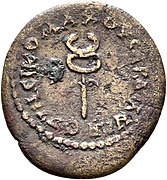 Coin from Sardis (Turkey) with caduceus (c. 140-144 CE)
Coin from Sardis (Turkey) with caduceus (c. 140-144 CE)
Mythology
The Homeric hymn to Hermes relates how his half brother Apollo was enchanted by Hermes's music from his lyre fashioned from a tortoise shell, which Hermes kindly gave to him. Apollo in return gave Hermes the caduceus as a gesture of friendship. The association with the serpent thus connects Hermes to Apollo, as later the serpent was associated with Asclepius, the "son of Apollo".
The association of Apollo with the serpent is a continuation of the older Indo-European dragon-slayer motif. Wilhelm Heinrich Roscher (1913) pointed out that the serpent as an attribute of both Hermes and Asclepius is a variant of the "pre-historic semi-chthonic serpent hero known at Delphi as Python", who in classical mythology is slain by Apollo.
One Greek myth of origin of the caduceus is part of the story of Tiresias, who found two snakes copulating and killed the female with his staff. Tiresias was immediately turned into a woman, and so remained until he was able to repeat the act with the male snake seven years later. This staff later came into the possession of the god Hermes, along with its transformative powers.
Another myth suggests that Hermes (or Mercury) saw two serpents entwined in mortal combat. Separating them with his wand he brought about peace between them, and as a result the wand with two serpents came to be seen as a sign of peace.
In Rome, Livy refers to the caduceator who negotiated peace arrangements under the diplomatic protection of the caduceus he carried.
Iconography
In some vase paintings ancient depictions of the Greek kerukeion are somewhat different from the commonly seen modern representation. These representations feature the two snakes atop the staff (or rod), crossed to create a circle with the heads of the snakes resembling horns. This old graphic form, with an additional crossbar to the staff, seems to have provided the basis for the graphical sign of Mercury (☿) used in Greek astrology from Late Antiquity.
Origin and comparative mythology
Further information: Serpent worship
The term kerukeion denoted any herald's staff, not necessarily associated with Hermes in particular.
In his study of the cult of Hermes, Lewis Richard Farnell (1909) assumed that the two snakes had simply developed out of ornaments of the shepherd's crook used by heralds as their staff. This view has been rejected by later authors pointing to parallel iconography in the Ancient Near East. It has been argued that the staff or wand entwined by two snakes was itself representing a god in the pre-anthropomorphic era. Like the herm or priapus, it would thus be a predecessor of the anthropomorphic Hermes of the classical era.
Ancient Near East


William Hayes Ward (1910) discovered that symbols similar to the classical caduceus sometimes appeared on Mesopotamian cylinder seals. He suggested the symbol originated some time between 3000 and 4000 BC, and that it might have been the source of the Greek caduceus. A.L. Frothingham incorporated Ward's research into his own work, published in 1916, in which he suggested that the prototype of Hermes was an "Oriental deity of Babylonian extraction" represented in his earliest form as a snake god. From this perspective, the caduceus was originally representative of Hermes himself, in his early form as the Underworld god Ningishzida, "messenger" of the "Earth Mother". The caduceus is mentioned in passing by Walter Burkert as "really the image of copulating snakes taken over from Ancient Near Eastern tradition".
In Egyptian iconography, the Djed pillar is depicted as containing a snake in a frieze of the Dendera Temple complex.
India
The caduceus also appears as a symbol of the punch-marked coins of the Maurya Empire in India, in the third or second century BC. Numismatic research suggest that this symbol was the symbol of the Buddhist king Ashoka, his personal "Mudra". This symbol was not used on the pre-Mauryan punch-marked coins, but only on coins of the Maurya period, together with the three arched-hill symbol, the "peacock on the hill", the triskelis and the Taxila mark. It also appears carved in basalt rock in few temples of western ghats.
Early modern use
During the early modern period, the caduceus was used as a symbol of rhetoric (associated with Mercury's eloquence).
Modern use
Symbol of commerce
A simplified caduceus is found in dictionaries, as a "commercial term" entirely in keeping with the association of Hermes with commerce. In this form the staff is often depicted with two winglets and the snakes omitted or reduced to a small ring in the middle. The customs service of the former German Democratic Republic demonstrated the caduceus' association with thresholds, translators, and commerce in the service medals issued to their staff. The caduceus is also the symbol of the customs agency of Bulgaria and of the financial administration of the Slovakia (Tax and Customs administration). The emblems of Belarus Customs and China Customs are a caduceus crossing with a golden key. The emblem of the Federal Customs Service of Russia has a caduceus crossing with a torch on the shield. The coat of arms of Kyiv National University of Trade and Economics of Ukraine has two crossed torches surmounted by a caduceus on the shield.
Confusion with Rod of Asclepius
Main article: Caduceus as a symbol of medicine

It is relatively common, especially in the United States, to find the caduceus, with its two snakes and wings, (mis)used as a symbol of medicine instead of the Rod of Asclepius, with only a single snake. This usage was popularized by the adoption of the caduceus as its insignia by the U.S. Army Medical Corps in 1902 at the insistence of a single officer (though there are conflicting claims as to whether this was Capt. Frederick P. Reynolds or Col. John R. van Hoff).
The Rod of Asclepius is the dominant symbol for professional healthcare associations in the United States. One survey found that 62% of professional healthcare associations used the rod of Asclepius as their symbol. The same survey found that 76% of commercial healthcare organizations use the caduceus. The author of the study suggests that professional associations are more likely to have a historical understanding of the two symbols, whereas commercial organizations are more likely to be concerned with the visual impact a symbol will have on its sales.
The long-standing historical association of the caduceus with commerce has engendered significant criticism of its use in medicine. Medical professionals argue that the Rod of Asclepius better represents the field of medicine. Writing in the journal Scientific Monthly, Stuart L. Tyson said of the Staff of Hermes (the caduceus):
As god of the high-road and the market-place Hermes was perhaps above all else the patron of commerce and the fat purse: as a corollary, he was the special protector of the traveling salesman. As spokesman for the gods, he not only brought peace on earth (occasionally even the peace of death), but his silver-tongued eloquence could always make the worse appear the better cause. From this latter point of view, would not his symbol be suitable for certain Congressmen, all medical quacks, book agents and purveyors of vacuum cleaners, rather than for the straight-thinking, straight-speaking therapeutist? As conductor of the dead to their subterranean abode, his emblem would seem more appropriate on a hearse than on a physician's car.
— Stuart L. Tyson, "The Caduceus", in the Scientific Monthly, 1932
Computer coding
| ☤ | |
|---|---|
| Caduceus | |
| In Unicode | U+2624 ☤ CADUCEUS |
| Different from | |
| Different from | U+2695 ⚕ STAFF OF AESCULAPIUS U+1F54F 🕏 BOWL OF HYGIEIA |
| Related | |
| See also | U+263F ☿ MERCURY U+269A ⚚ STAFF OF HERMES U+1F750 🝐 ALCHEMICAL SYMBOL FOR CADUCEUS U+2BDA ⯚ HYGIEA |
For use in documents prepared on computer, the symbol has code point in Unicode, at U+2624 ☤ CADUCEUS. There is a similar glyph encoded at U+269A ⚚ STAFF OF HERMES, an alchemical symbol at U+1F750 🝐 ALCHEMICAL SYMBOL FOR CADUCEUS, and an astrological one at U+2BDA ⯚ HYGIEA. These symbols are not provided in all fonts, especially older ones.
Coats of arms and flags
The symbol is depicted on multiple coats of arms and flags.
Caduceus in coats of arms and flags-
 Caduceus on the coat of arms of Jyväskylä, Finland
Caduceus on the coat of arms of Jyväskylä, Finland
-
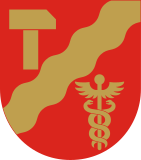 Coat of arms of Tampere, Finland
Coat of arms of Tampere, Finland
-
 Coat of arms of Lassay-les-Châteaux, France
Coat of arms of Lassay-les-Châteaux, France
-
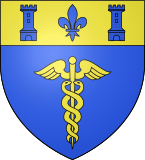 Coat of arms of Saint-Pantaléon, France
Coat of arms of Saint-Pantaléon, France
-
 Coat of arms of Gmina Nur, Poland
Coat of arms of Gmina Nur, Poland
-
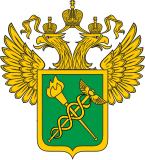 Emblem of the Federal Customs Service of Russia
Emblem of the Federal Customs Service of Russia
-
 Coat of arms of Irbit, Russia
Coat of arms of Irbit, Russia
-
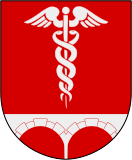 Coat of arms of Bengtsfors Municipality, Sweden
Coat of arms of Bengtsfors Municipality, Sweden
-
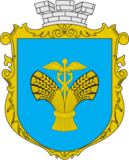 Coat of arms of Balta, Ukraine
Coat of arms of Balta, Ukraine
-
 Coat of arms of Berdychiv, Ukraine
Coat of arms of Berdychiv, Ukraine
-
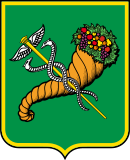 Coat of arms of Kharkiv, Ukraine
Coat of arms of Kharkiv, Ukraine
-
 Emblem of the Volapük language
Emblem of the Volapük language
-
 Customs flag of Belarus, with a Caduceus crossed with a golden key at the center
Customs flag of Belarus, with a Caduceus crossed with a golden key at the center
-
 Customs flag of China, with a Caduceus crossed with a golden key at the lower fly half
Customs flag of China, with a Caduceus crossed with a golden key at the lower fly half
-
 Flag of the City of Brisbane, Australia
Flag of the City of Brisbane, Australia
-
 Flag of Vancouver Island, Canada (unofficial)
Flag of Vancouver Island, Canada (unofficial)
See also
- Aaron's rod – Staves carried by Moses's brother, Aaron, in the Torah
- Amphisbaena – Mythological serpent
- Bowl of Hygieia – Symbol of pharmacy
- Crozier – Ceremonial staff in Christianity
- Double-headed eagle – Symbol used in heraldry
- Healing Simurgh – Symbol of medicine in Iran
- Mithraic mysteries – Mystery religion in the Roman EmpirePages displaying short descriptions of redirect targets
- Nehushtan – Brass serpent in Torah
- Ningishzida – Mesopotamian god
- Serpent (symbolism) – Mythological symbolPages displaying short descriptions of redirect targets
- Staff of Moses – Walking stick used by Moses
- Star of Life – Emergency medical service symbol
Notes
- It is unclear whether the inscription refers to a patron who paid for the statue, or to the sculptor of the statue.
- The Latin word cādūceus is an adaptation of the Greek word, itself derived from κῆρυξ kêrux "messenger, herald, envoy".
References
- Liddell and Scott, Greek–English Lexicon
- Tyson (1932), p. 493.
- Gary Lachman, "The Quest for Hermes Trismigestus", 2011, Chapter 3, p. x.
- Lisman (2013), p. 34.
- William Godwin (1876). "Lives of the Necromancers". p. 37.
- ^ "Miscellaneous Symbols". Unicode Consortium. Archived from the original on 2012-12-04. Retrieved 2021-09-14.
U+269A ⚚ STAFF OF HERMES signifies a commercial term or commerce
- Friedlander (1992), p. 83.
- Howey, M. Oldfield (1955). The Encircled Serpent: A Study of Serpent Symbolism in All Countries And Ages. New York: Arthur Richmond Co. p. 77.
In modern times the caduceus figures as a symbol of commerce, since Mercury is the god of commerce
- Bonnefoy, Yves, ed. (1992). Roman and European Mythologies. Translated by Wendy Doniger. University of Chicago Press. p. 135.
The name of the god Mercury cannot be disassociated from the word merx, which means merchandise. Such was the sentiment of the ancients.
- Bakich, Michael E. (2000). The Cambridge Planetary Handbook. Cambridge University Press. p. 85.
Mercury was the Roman name for the Greek god Hermes. His Latin name was apparently derived from merx or mercator, a merchant.
- ^ Engle, Bernice (Dec 1929). "The Use of Mercury's Caduceus as a Medical Emblem"". The Classical Journal. 25 (1): 205.
- Tyson (1932), p. 494.
- Deldon, Anne McNeely (1996). Mercury rising: women, evil, and the trickster gods. Spring Publications. p. 90. ISBN 978-0-88214-366-8.
Homer tell us that Hermes' caduceus, the golden wand, was acquired by Hermes from Apollo in exchange for the tortoise-lyre; later the caduceus changed hands again from Hermes to Apollo's son, Asclepius.
- Davis, S (1953). "Argeiphontes in Homer – The Dragon-Slayer". Greece & Rome. 22 (64): 33–38. doi:10.1017/S0017383500011712. JSTOR 640827. S2CID 163106261. (citing W. H. Roscher, Omphalos (1913))
- Blayney, Keith (September 2002). "The Caduceus vs the Staff of Asclepius". Archived from the original on 2019-10-16. Retrieved 2007-06-15.
- Tyson (1932), p. 495.
- Livy: Ab Urbe Condita Libri, 31,38,9–10
- "Signs and Symbols Used In Writing and Printing", p 269, in Webster's New Twentieth Century Dictionary of the English Language, unabridged, New York, 1953. Here the symbol of the planet Mercury is indicated as "the caduceus of Mercury, or his head and winged cap".
- Oxford Classical Dictionary, third edition, ed. Hornblower and Spawforth, s.v. "Hermes".
- Farnell, The Cults of the Greek States, vol. 5, p. 20, cited in Tyson 1932:494.
- A. L. Frothingham (1916). "Babylonian Origin of Hermes the Snake-God, and of the Caduceus I". American Journal of Archaeology. 20, No. 2 (April–June, 1916) (2): 175–211. doi:10.2307/497115. JSTOR 497115. Frothingham characterizes Farnell's simplistic view of the origin of the symbol as a "frivolous and futile theory".
- William Hayes Ward, The Seal Cylinders of Western Asia, Washington, 1910
- A.L. Frothingham, "Babylonian Origins of Hermes the Snake-God, and of the Caduceus", in American Journal of Archaeology, Vol. 20, No. 2, pp. 175–211
- Burkert, Greek Religion 1985: II.2.8, p. 158; Burkert notes H. Frankfort, in Iraq, 1 (1934:10) and E.D. van Buren, in Archiv für Orientforschung, 10 (1935/36:53-65).
- Damodar Dharmanand Kosambi, Indian Numismatics, Orient Longman, New Delhi 1981, p. 73 (online).
- Kailash Chand Jain, Malwa Through the Ages. From the Earliest Time to 1305 A.D., Motilal Banarsidass, Delhi et al. 1972, p. 134 (online).
- Noldus, B.; Roding, J., eds. (2007). Pieter Isaacsz (1569-1625): Court Painter, Art Trader and Spy. Brepol. pp. 280, 288. ISBN 9782503524665.
- "Logo of the Financial Administration of the Slovak Republic" (PDF). Archived from the original (PDF) on 2019-02-20. Retrieved 2019-02-20.
- Belarus Customs. "Customs heraldy". Archived from the original on 2020-09-20. Retrieved 2020-08-12.
- "Belarus - Customs Flag". FOTW. Archived from the original on 2020-08-11. Retrieved 2020-08-12.
- 海关关徽 Archived 2018-10-14 at the Wayback Machine.
- F.H. Garrison, "The Use of the Caduceus in the Insignia of the Army Medical Officer", in Bull. Med. Lib. Assoc. IX (1919-20), 13-16
- ^ Friedlander, Walter J (1992). The Golden Wand of Medicine: A History of the Caduceus symbol in medicine. Greenwood Press. ISBN 0-313-28023-1.
- Bohigian, George (2019). "The Caduceus vs. Staff of Aesculapius - One Snake or Two?". Missouri Medicine. 116 (6): 476–477.
"The Staff of Aesculapius has represented medicine since 800 BCE and most authorities support its use as the symbol of medicine
- An allusion to John Milton's description of Belial in Paradise Lost II.113-114.
- Tyson, Stuart L (1932). "The Caduceus". Scientific Monthly. 34 (6): 495.
- "Brisbane City Council: Symbols used by Council". Brisbane City Council. Archived from the original on 2023-03-26. Retrieved 2022-01-11.
Sources
- Friedlander, Walter J. (1992). The Golden Wand of Medicine: A History of the Caduceus Symbol in Medicine. Greenwood Press. ISBN 978-0-313-28023-8..
- Lisman, J.W. (2013). Cosmogony, Theogony and Anthropogeny in Sumerian texts. Ugarit-Verlag.
- Tyson, Stuart L. (1932). "The Caduceus". The Scientific Monthly. 34 (6): 492–498. Bibcode:1932SciMo..34..492T.
Further reading
- Bunn, J. T. Origin of the caduceus motif, JAMA, 1967. United States National Institutes of Health: National Center for Biotechnology Information. PMID 4863068
- Burkert, Walter, Structure and History in Greek Mythology and Ritual, Translation, University of California, 1979.
External links
- Iris and Infant Hermes with Caduceus
- Caduceus from Encyclopædia Britannica
- Fenkl, Heinz Insu, Caduceus
| Reptiles in culture | ||
|---|---|---|
| Dinosaurs |  | |
| Snakes | ||
| Other | ||


